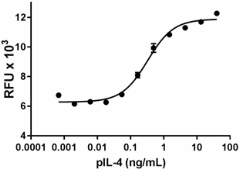- Regulatory Status
- RUO
- Other Names
- B cell growth factor 1 (BCGF-1), B-cell stimulatory factor 1 (BSF-1), B cell growth factor 1, interleukin-4, lymphocyte stimulatory factor 1.

-

Porcine IL-4 induces the proliferation of human TF-1 cells in a dose-dependent manner. The ED50 for this effect is 0.2 – 1 ng/mL.
| Cat # | Size | Price | Quantity Check Availability | ||
|---|---|---|---|---|---|
| 782801 | 5 µg | $112.00 | |||
| 782803 | 20 µg | $253.00 | |||
Select size of product is eligible for a 40% discount! Promotion valid until December 31, 2024. Exclusions apply. To view full promotion terms and conditions or to contact your local BioLegend representative to receive a quote, visit our webpage.
L-4 is the primary cytokine implicated in the development of Th2-mediated responses, which is associated with allergy and asthma. The Type I receptor comprises IL-4Rα and the common gamma-chain (γc), which is also shared by the cytokines IL-2, -7, -9, -15 and -21 and is present in hematopoietic cells. IL-4 can use the type II complex, comprising IL-4Rα and IL-13Rα1, which is present in non-hematopoietic cells. This second receptor complex is a functional receptor for IL-13, which shares approximately 25% homology with IL-4. The type I receptor complex can be formed only by IL-4 and is active in Th2 development. In contrast, the type II receptor complex formed by either IL-4 or IL-13 is more active during airway hypersensitivity and mucus secretion and is not found in T cells.
Product Details
- Source
- Porcine IL-4, amino acid Met - (His25 – Cis133) (Accession #Q04745) was expressed in E.coli.
- Molecular Mass
- The 110 amino acid recombinant protein has a predicted molecular mass of approximately 12.6 kD. The predicted N-terminal amino acid isMet.
- Purity
- >95%, as determined by Coomassie stained SDS-PAGE.
- Formulation
- Lyophilize from sterile 0.22 µm filtered protein solution is in PBS pH 7.2.
- Endotoxin Level
- Less than 1 EU per µg protein as determined by the LAL method.
- Concentration
- Lyophilized recombinant protein is at 5 and 20 µg total protein
- Storage & Handling
- Unopened vial can be stored between 2°C and 8°C for one month, at -20°C for six months, or at -70°C for one year. For maximum results, quick spin vial prior to opening. Reconstitute the protein in sterile water at 0.1 mg/mL. The protein can be aliquoted and stored at -20°C to -70°C. Stock solutions can also be prepared at 50 - 100 µg/mL in sterile buffer (PBS, HPBS, DPBS, or EBSS) containing carrier protein such as 0.2 - 1% BSA or HSA and stored in working aliquots at -20°C to -70°C. Avoid repeated freeze/thaw cycles.
- Activity
- Porcine IL-4 induces the proliferation of human TF-1 cells in a dose-dependent manner. The ED50 for this effect is 0.2– 1 ng/mL.
- Application
-
Bioassay
- Application Notes
-
BioLegend carrier-free recombinant proteins provided in lliophylized format are shipped on blue ice.
Antigen Details
- Structure
- Cytokine
- Distribution
-
IL-4 is produced by Th2 cells, naive CD4+ T cells, NKT cells, and basophils.
- Function
- IL-4 has a crucial role in the differentiation of Th2 cells and induction of Th2 associated cytokines. IL-4, through its activation of STAT6, upregulates GATA3 expression and also suppresses Th1 and Th17 cell responses, partly through the upregulation of growth factor independent 1(GFI1), a transcriptional repressor of IFNγ and IL-17 production. IL-4 induces macrophage activation and TSLP production. IL-4 recruits and activates IgE-producing B cells (IgE class switching) and enhances IgE-mediated responses by up-regulating IgE receptors on B lymphocytes, mast cells, and basophils. In addition, IL-4 also induces VCAM-1 on vascular endothelium and thus directs the migration of T lymphocytes, monocytes, basophils, and eosinophils to the inflammation site.
- Interaction
- T cells, B cells, macrophages, epithelial cells, smooth muscle cells, and bronchial fibroblasts.
- Ligand/Receptor
- IL-4 signals through Type I receptor complex (IL-4Rα, γc) and Type II receptor complex (IL-4Rα, IL-13Rα1
- Bioactivity
- IL-4 signals through Type I (IL-4Rα, γc) and Type II (IL-4Rα, IL-13Rα1) receptor complexes
- Cell Type
- Embryonic Stem Cells, Hematopoietic stem and progenitors
- Biology Area
- Cell Biology, Immunology, Stem Cells
- Molecular Family
- Cytokines/Chemokines
- Antigen References
-
- Swain SL, et al. 1990. J. Immunol. 145:3796.
- Hsieh CS, et al. 1992. P. Natl. Acad. Sci. USA 89:6065.
- Allison-Lynn A, et al. 2006. J. Immunol. 176:7456.
- Kato A, et al. 2007. J. Immunol. 179:1080.
- LaPorte SL, et al. 2008. Cell 132:259.
- Martinez FO, et al. 2009. Annu. Rev. Immunol. 27:451.
- Gene ID
- 397225 View all products for this Gene ID
- UniProt
- View information about IL-4 on UniProt.org
